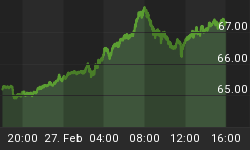I wanted to take a moment and revisit a wonderful essay written April 3, 2005 by Professor Robert Bell titled The Invisible Hand (of the US Government) in Financial Markets. In this essay, Bell outlines the significance of The American Jobs Creation Act signed into law on Oct. 22/04. In his paper, Bell explains that the law provides American companies with monies "off shore" to repatriate it for a one year period and have their effective tax rates on these repatriated funds lowered from 35% to 5.25%. He predicted that this would result in a substantial flow of homeward bound funds. He concluded as a result of his analysis, that bearish sentiment toward the U.S. dollar [particularly negative at the time] would not likely be manifested with the dollar making new lows. In fact, Bell was one of the only prognosticators that I remember reading who had a fundamentally credible thesis as to why the dollar would do better in spite of the burdening twin deficits - even if only temporarily. I think folks should take a look at what the dollar has done since early April when Mr. Bell put his assessment on the line, so to speak:

Compliments: www.shocktcharts.com
I take my hat off to Mr. Bell and thank him for his analysis. It should be pointed out first and foremost - with the name of the law being The American Jobs Creation Act - the basis for granting corporate tax holidays was advertised as and with hopes that repatriated funds would be invested in plant, equipment and human capital [job creation]. But due to the reality that,
Takeovers are on the limited menu of activities companies are permitted to do with the money they can "repatriate" under this law.
Bell further speculated that this torrent of repatriated cash would fuel a wave of mergers and acquisitions - which would likely result in the loss of jobs - all in the name of synergy creating redundancies. If we use the Birth/Death model chart from the BLS [Bureau of Labor Statistics] as a proxy for where/if any "likely" jobs are being created, we can clearly see that even the BLS does not seem to put much stock in the notion that jobs are being created in many areas - save leisure, financial services and house construction.
| 2005 Net Birth/Death Adjustment (in thousands) | ||||||||||||
| Supersector | Jan | Feb | Mar | Apr | May | Jun | Jul | Aug | Sep | Oct | Nov | Dec |
| Natural Resources & Mining | -5 | 0 | 0 | 0 | 1 | 1 | ||||||
| Construction | -60 | 9 | 31 | 34 | 38 | 29 | ||||||
| Manufacturing | -38 | 3 | 6 | 1 | 8 | 8 | ||||||
| Trade, Transportation, & Utilities | -50 | 9 | 25 | 18 | 26 | 23 | ||||||
| Information | 1 | 3 | -1 | 11 | 7 | 0 | ||||||
| Financial Activities | -7 | 9 | 9 | 13 | 10 | 11 | ||||||
| Professional & Business Services | -115 | 21 | 56 | 64 | 19 | 25 | ||||||
| Education & Health Services | 7 | 14 | 8 | 21 | 14 | -1 | ||||||
| Leisure & Hospitality | -6 | 28 | 37 | 90 | 75 | 81 | ||||||
| Other Services | -7 | 4 | 8 | 5 | 9 | 7 | ||||||
| Total | -280 | 100 | 179 | 257 | 207 | 184 | ||||||
| From: BLS | ||||||||||||
While scheduled tax breaks continue next yr. under the American Jobs Creation Act, the tax savings are not nearly as big - so it's perhaps a good bet that any repatriation of funds that happens is likely going to be 'front loaded' into this calendar year. According to Bank of America's [B of A] assessment of the situation, there is perhaps a potential pool of about 700 billion held off shore by U.S. based multi nationals. They anticipate that 300 or so billion might be repatriated under the Jobs Act.
If we accept the preceding, we might conclude that:
-
a good chunk of the dollar's strength can perhaps be attributed to the Jobs Act induced repatriation of funds
-
it is quite likely the Jobs Act likely didn't produce the jobs hoped for
The real reason for bringing this topic up was not so much to study the past, but perhaps get a handle on what the near future might hold if we accept and then extrapolate on some of the conclusions of Professor Bell - which in my mind deserve a grade of A+.
In light of what has already occurred, I would suggest that in the absence of a "new" stimulus package - it might be a logical speculation that the U.S. dollar will come under renewed selling pressure or resume its downward trajectory soon after the stimulating effects of the Jobs Act conclude on Oct. 22 of 05. Flowing from that, another logical speculation might perhaps be a decline in M & A activity late this fall along with an accompanying disincentive to own or hold equities who earn their keep from fees in this and associated activity.
We'll revisit and re-grade on our next report card.















